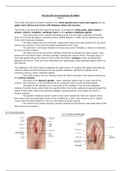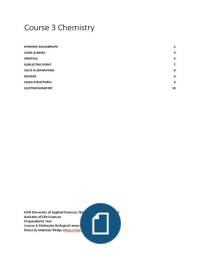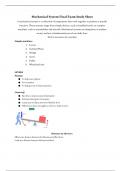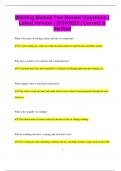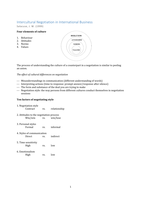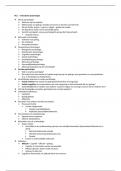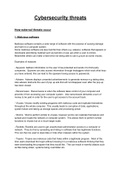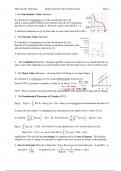Business Law - Summary Lectures & Book
Lecture 1
A business corporation has five core structural characteristics and corporate law is aimed to
control conflicts of interests:
1. Legal Personality. Corporation serves as a contracting party. ‘’Separate patrimony’’ -
Shareholders own their shares, not the assets.
Entity shielding: While limited liability shields owners’ personal assets from a firm’s creditors,
entity shielding protects firm assets from the owners’ personal creditors (and from creditors of
other business ventures), thus reserving those assets for the firm’s creditors, involving:
- The priority rule: (Bankruptcy law) Creditors are paid in full before other
junior/personal creditors receive anything.
- Rule of Liquidation Protection: Individual owners of the corporation (the
shareholders) cannot withdraw their share of firm assets at will, (so can’t
force partial or complete liquidation of the firm) nor can the personal
creditors of an individual owner foreclose on the owner’s share of firm
assets.
2. Limited Liability. Shareholders are only liable up to their committed investment: owner
shielding (opposite to entity shielding - together ‘’asset partitioning’’). It lowers the risk for
shareholders’ portfolios due to the limited risk of downside losses.
Creditor: An individual, business or any other entity that is owed money because they have
provided a service or good, or loaned money to another entity
- Tort victims are “involuntary creditors” (i.e., former employees suffering from asbestos,
industrial accidents etc.) → Externalities
‘’Veil Piercing’’ - A legal decision to treat the rights or duties of a corporation as the rights or
liabilities of its shareholders. Common law countries usually uphold this principle of separate
personhood, but in exceptional situations may "pierce" or "lift" the corporate veil, when a person
for example breaches a contract/promise. → Based on case law.
Common Law (UK, US) - Case-based law, quite flexible and can easily adapt to new forms of
managerial misuse
Civil Law (EU) - Based on the interpretation of the legal text, less flexible. Shareholder
protection is the lowest, and debtholder protection is the highest. Ownership concentration is
highest → a good substitute for low investor protection
Sarbanes-Oxley Act: To protect investors by improving the accuracy and reliability of corporate
disclosures made pursuant to the securities laws and for other purposes.
Delaware (US) (/Place of incorporation rule): Companies are free to incorporate in any state
regardless of whether they are doing business there or have any contact with this state. Creates
the opportunity for a jurisdiction to induce firms to incorporate under its laws, which benefits the
state by bringing revenue directly to it and indirectly by the increased demand for local services,
making the corporate law attractive → Corporate law is driven by market forces (rather than
political ones) that are influenced by the companies’ demands.
1
, Less regulatory competition in Europe than in the US. Why?
● Reputational aspects
● Two conflicting doctrines in Europe:
- Doctrine of incorporation
- Doctrine of real seat
1. Mandatory rules: Can’t be modified by contract and are usually aimed at the protection of
weaker parties (e.g. creditors). Help corporate actors signal the terms they offer and allow them
to bond themselves to those terms. Provide standard forms of legal entities from which parties
can choose when structuring an organization.
2. Default (standardized) rules: Applicable in case articles of association or another contract do
not state otherwise. Saves costs and simplifies relationship parties. → Either corporate law
offers a statutory provision or an alternative provision
Lecture 2
3. Transferable Shares. Shares can be traded between buyers and sellers at a mutually
agreed price. They cannot be withdrawn from society unless the rules state otherwise. It
permits the firm to keep doing business without interruptions while changing the identity
of the owner.
Freely tradable means the shares are authorized, issued, fully paid
and for resale. It gives the firm maximal flexibility in raising capital and
maximizes the liquidity of shareholdings and the ability of shareholders
to diversify their investments. Big difference between private (closed)
and public (open) corporations, and especially listed firms.
Investor Ownership includes buying a share (a bundle of rights):
- The right to control the firm (including decision-making)
- The right to receive the firm’s net earnings
4. Centralized Management under a board structure.
Especially in large corporations (widely-dispersed):
Numerous and constantly changing owners. This causes
inefficient decision-making and; collective action
problems.
5. Shared Ownership by contributors of equity capital. (Co-ownership: It takes one
property, more than one owner, and blends them to maximize profit and tax deductions.
Typically, the parties find a home and buy it together as co-owners, but sometimes they
join to co-own a property one of them already owns. At the end of an agreed term, they
buy one another out or sell the property and split the equity.)
2
Lecture 1
A business corporation has five core structural characteristics and corporate law is aimed to
control conflicts of interests:
1. Legal Personality. Corporation serves as a contracting party. ‘’Separate patrimony’’ -
Shareholders own their shares, not the assets.
Entity shielding: While limited liability shields owners’ personal assets from a firm’s creditors,
entity shielding protects firm assets from the owners’ personal creditors (and from creditors of
other business ventures), thus reserving those assets for the firm’s creditors, involving:
- The priority rule: (Bankruptcy law) Creditors are paid in full before other
junior/personal creditors receive anything.
- Rule of Liquidation Protection: Individual owners of the corporation (the
shareholders) cannot withdraw their share of firm assets at will, (so can’t
force partial or complete liquidation of the firm) nor can the personal
creditors of an individual owner foreclose on the owner’s share of firm
assets.
2. Limited Liability. Shareholders are only liable up to their committed investment: owner
shielding (opposite to entity shielding - together ‘’asset partitioning’’). It lowers the risk for
shareholders’ portfolios due to the limited risk of downside losses.
Creditor: An individual, business or any other entity that is owed money because they have
provided a service or good, or loaned money to another entity
- Tort victims are “involuntary creditors” (i.e., former employees suffering from asbestos,
industrial accidents etc.) → Externalities
‘’Veil Piercing’’ - A legal decision to treat the rights or duties of a corporation as the rights or
liabilities of its shareholders. Common law countries usually uphold this principle of separate
personhood, but in exceptional situations may "pierce" or "lift" the corporate veil, when a person
for example breaches a contract/promise. → Based on case law.
Common Law (UK, US) - Case-based law, quite flexible and can easily adapt to new forms of
managerial misuse
Civil Law (EU) - Based on the interpretation of the legal text, less flexible. Shareholder
protection is the lowest, and debtholder protection is the highest. Ownership concentration is
highest → a good substitute for low investor protection
Sarbanes-Oxley Act: To protect investors by improving the accuracy and reliability of corporate
disclosures made pursuant to the securities laws and for other purposes.
Delaware (US) (/Place of incorporation rule): Companies are free to incorporate in any state
regardless of whether they are doing business there or have any contact with this state. Creates
the opportunity for a jurisdiction to induce firms to incorporate under its laws, which benefits the
state by bringing revenue directly to it and indirectly by the increased demand for local services,
making the corporate law attractive → Corporate law is driven by market forces (rather than
political ones) that are influenced by the companies’ demands.
1
, Less regulatory competition in Europe than in the US. Why?
● Reputational aspects
● Two conflicting doctrines in Europe:
- Doctrine of incorporation
- Doctrine of real seat
1. Mandatory rules: Can’t be modified by contract and are usually aimed at the protection of
weaker parties (e.g. creditors). Help corporate actors signal the terms they offer and allow them
to bond themselves to those terms. Provide standard forms of legal entities from which parties
can choose when structuring an organization.
2. Default (standardized) rules: Applicable in case articles of association or another contract do
not state otherwise. Saves costs and simplifies relationship parties. → Either corporate law
offers a statutory provision or an alternative provision
Lecture 2
3. Transferable Shares. Shares can be traded between buyers and sellers at a mutually
agreed price. They cannot be withdrawn from society unless the rules state otherwise. It
permits the firm to keep doing business without interruptions while changing the identity
of the owner.
Freely tradable means the shares are authorized, issued, fully paid
and for resale. It gives the firm maximal flexibility in raising capital and
maximizes the liquidity of shareholdings and the ability of shareholders
to diversify their investments. Big difference between private (closed)
and public (open) corporations, and especially listed firms.
Investor Ownership includes buying a share (a bundle of rights):
- The right to control the firm (including decision-making)
- The right to receive the firm’s net earnings
4. Centralized Management under a board structure.
Especially in large corporations (widely-dispersed):
Numerous and constantly changing owners. This causes
inefficient decision-making and; collective action
problems.
5. Shared Ownership by contributors of equity capital. (Co-ownership: It takes one
property, more than one owner, and blends them to maximize profit and tax deductions.
Typically, the parties find a home and buy it together as co-owners, but sometimes they
join to co-own a property one of them already owns. At the end of an agreed term, they
buy one another out or sell the property and split the equity.)
2


